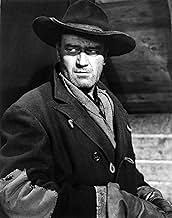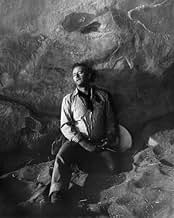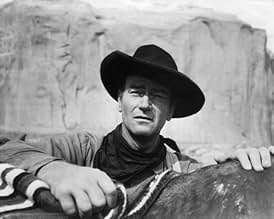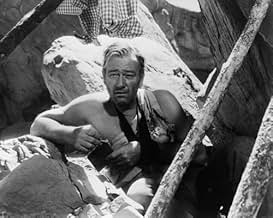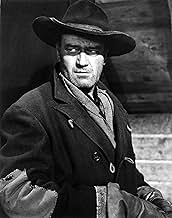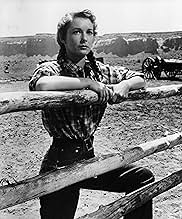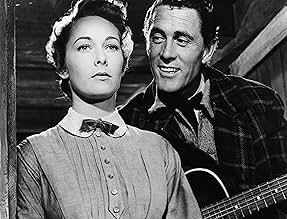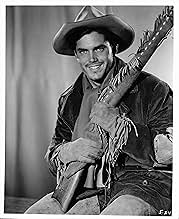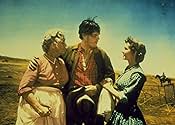An American Civil War veteran embarks on a years-long journey to rescue his niece from the Comanches after the rest of his brother's family is massacred in a raid on their Texas farm.An American Civil War veteran embarks on a years-long journey to rescue his niece from the Comanches after the rest of his brother's family is massacred in a raid on their Texas farm.An American Civil War veteran embarks on a years-long journey to rescue his niece from the Comanches after the rest of his brother's family is massacred in a raid on their Texas farm.
- Awards
- 4 wins & 4 nominations total
Patrick Wayne
- Lt. Greenhill
- (as Pat Wayne)
- Director
- Writers
- All cast & crew
- Production, box office & more at IMDbPro
Storyline
Did you know
- TriviaConsidering the part of Ethan Edwards to be the best character that he ever portrayed on-screen and The Searchers (1956) to be his favorite film role, John Wayne named his youngest son Ethan Wayne in homage.
- GoofsThe "dead" Indian under the rock, when the rock is removed, is clearly breathing.
- Crazy creditsThe credits state this Warner Brothers film is in VistaVision; this may be the only Warner film in VistaVision.
- ConnectionsEdited into Histoire(s) du cinéma: Fatale beauté (1994)
- SoundtracksThe Searchers (Main Theme)
Composed by Max Steiner
Lyrics by Stan Jones
Sung by Sons of the Pioneers (uncredited)
Featured review
A second look at this film is long overdue. It's been hailed by many as a masterpiece. Even the anti-Ford critic David Thomson in The New Biographical Dictionary of Film classifies it as an exceptional work. I don't know whether it's the Ford mystique, the Wayne icon, or the mesmerizing beauty of Monument Valley that holds this movie to a different standard from most Westerns. But something is at work that numbs a critical eye-level inquiry. The Searchers is a good film, but no masterpiece, and certainly does not belong in the American Film Institute's list of top 100 films of all time. A brief look at some of the more obvious defects:
Ford makes picture postcards out of the soaring spires and buttes. At no point, however, does he come to grips with the real harshness of the terrain. This is desert country. Hardly anything grows-- just look at the sparseness of greenery. Yet we're told cattle herds feed here in large enough numbers to support families, (In the movie, Jorgensen's right-- they would be better off raising pigs than cattle). Then too, there is absolutely no hint of the desert heat or cold affecting anything or anybody. The parties go here and there with slim regard for what the conditions actually afford. In short, the celebrated landscape amounts to little more than a majestic backdrop without a true reality of its own. Ford may love this Spartan terrain, but he gives it scant respect.
Similarly, the film-maker undercuts the naturalism of the vaunted visuals. The audience gets an awesome flow of natural wonders, only to have the flow interrupted by outdoor sets so painfully obvious, they can't be ignored, (consider the Futterman ambush scene, for one). As a result, visual continuity is sacrificed and so is fidelity to the intended atmosphere. Suddenly we're jolted out of the scenic spell back into recognition that this is, after all, only a movie. Where, one wonders, was Ford's very real poetic eye in these disruptive scenes, and why didn't he insist on shooting all outdoor scenes outdoors-- especially after traveling to Colorado for the great snow scenes. As a premier film-maker, I'm sure he had the clout. Nonetheless, the lapse is another glaring defect.
There's another problem with respect, this time for the adversary. In fact, the Indians do get some concessions--Scar is provided a moment of motivation and a good sarcastic aside-- but not much else. As in Ford's cavalry cycle, aboriginal peoples still exist as convenient devices and sitting ducks. From the film's several battles, it seems the Indians know nothing about combat tactics. Stupidly, they never attack unless an escape route is left open to the fleeing settlers. And when they attack frontally across the river or in front of the cave, they mass in a bunch so the dug-in whites can hardly miss. No wonder there are so few Indians left. In most Westerns, this cliché would not even merit comment, but remember this one's supposed to be a "masterpiece".(For a gauge of Ford's dishonesty, compare his cardboard warriors with the skilled and savvy combatants in the similarly themed "Ulzana's Raid" {1973}).
For what is required of the actors, contrast the first ten minutes with the movie's remainder. Those first few minutes are little short of superb. There's a low-key naturalism and subtlety that's fascinating-- Just who is Ethan Edwards? What is the tension between his brother and him? And where did he get that impressive war medal? The well-crafted impression is that of real people concealing true feelings, while groping toward some kind of reconciliation across unspoken barriers. Then Ward Bond and the posse arrive and slam-bang stereotypes take over. The promising beginning is lost, while Ford reverts to form by replacing character with caricature. Bond, for example, stands not just as a gruff old man, but as The Gruff Old Man; Jeffrey Hunter is not just a callow youth, but The Callow Youth; and most egregiously, Ken Curtis is not merely one more country yokel, but The Rub-your-Nose-In-It Country Yokel. Moreover, conversation ceases, hat-throwing and shouting take over, and genuine interaction gives way to exaggerated personalities doing little more than bouncing off one another. Even Wayne's one-note avenger comes close to parody, (unlike others, however, he is never mocked). Of course, such caricatures provide ample grist for Ford's broad idea of humor. Nonetheless, the comic set-ups come perilously close at times to a Three Stooges level, particularly the scenes with Old Mose, and with Bond and Patrick Wayne. I'm not against comic relief, but I am when it flirts with burlesque in an otherwise serious film.
More could be pointed out, such as the distracting subplots, or the ludicrous wedding sequence, or most glaringly, the climax with its sudden, unmotivated change of heart-- after all, it's the racial conflict that drives the plot. I guess what really bothers me is how blithely Ford substitutes his own highly simplistic vision of the Old West for any really plausible version. There's a basic lack of respect for the material, which allows, for example, such facile touches as Jorgensen's unweathered two-story wooden house in the middle of the desert, or Vera Miles' brocaded form-fitting wedding gown that appears to have been flown in from Paris. My point is not that the film lacks merit-- the justly celebrated doorway shots, for example. Rather, it's one of perspective-- this is an entertaining film but far from a masterpiece.The Searchers may be lauded and popular with many. Nonetheless, beneath the glossy surface lies an under-developed theme that really deserved better than standard stock company treatment. In short, Thomson is wrong. The Searchers is not an exception to Ford's usual product. Rather, it's just a little less compromised.
Ford makes picture postcards out of the soaring spires and buttes. At no point, however, does he come to grips with the real harshness of the terrain. This is desert country. Hardly anything grows-- just look at the sparseness of greenery. Yet we're told cattle herds feed here in large enough numbers to support families, (In the movie, Jorgensen's right-- they would be better off raising pigs than cattle). Then too, there is absolutely no hint of the desert heat or cold affecting anything or anybody. The parties go here and there with slim regard for what the conditions actually afford. In short, the celebrated landscape amounts to little more than a majestic backdrop without a true reality of its own. Ford may love this Spartan terrain, but he gives it scant respect.
Similarly, the film-maker undercuts the naturalism of the vaunted visuals. The audience gets an awesome flow of natural wonders, only to have the flow interrupted by outdoor sets so painfully obvious, they can't be ignored, (consider the Futterman ambush scene, for one). As a result, visual continuity is sacrificed and so is fidelity to the intended atmosphere. Suddenly we're jolted out of the scenic spell back into recognition that this is, after all, only a movie. Where, one wonders, was Ford's very real poetic eye in these disruptive scenes, and why didn't he insist on shooting all outdoor scenes outdoors-- especially after traveling to Colorado for the great snow scenes. As a premier film-maker, I'm sure he had the clout. Nonetheless, the lapse is another glaring defect.
There's another problem with respect, this time for the adversary. In fact, the Indians do get some concessions--Scar is provided a moment of motivation and a good sarcastic aside-- but not much else. As in Ford's cavalry cycle, aboriginal peoples still exist as convenient devices and sitting ducks. From the film's several battles, it seems the Indians know nothing about combat tactics. Stupidly, they never attack unless an escape route is left open to the fleeing settlers. And when they attack frontally across the river or in front of the cave, they mass in a bunch so the dug-in whites can hardly miss. No wonder there are so few Indians left. In most Westerns, this cliché would not even merit comment, but remember this one's supposed to be a "masterpiece".(For a gauge of Ford's dishonesty, compare his cardboard warriors with the skilled and savvy combatants in the similarly themed "Ulzana's Raid" {1973}).
For what is required of the actors, contrast the first ten minutes with the movie's remainder. Those first few minutes are little short of superb. There's a low-key naturalism and subtlety that's fascinating-- Just who is Ethan Edwards? What is the tension between his brother and him? And where did he get that impressive war medal? The well-crafted impression is that of real people concealing true feelings, while groping toward some kind of reconciliation across unspoken barriers. Then Ward Bond and the posse arrive and slam-bang stereotypes take over. The promising beginning is lost, while Ford reverts to form by replacing character with caricature. Bond, for example, stands not just as a gruff old man, but as The Gruff Old Man; Jeffrey Hunter is not just a callow youth, but The Callow Youth; and most egregiously, Ken Curtis is not merely one more country yokel, but The Rub-your-Nose-In-It Country Yokel. Moreover, conversation ceases, hat-throwing and shouting take over, and genuine interaction gives way to exaggerated personalities doing little more than bouncing off one another. Even Wayne's one-note avenger comes close to parody, (unlike others, however, he is never mocked). Of course, such caricatures provide ample grist for Ford's broad idea of humor. Nonetheless, the comic set-ups come perilously close at times to a Three Stooges level, particularly the scenes with Old Mose, and with Bond and Patrick Wayne. I'm not against comic relief, but I am when it flirts with burlesque in an otherwise serious film.
More could be pointed out, such as the distracting subplots, or the ludicrous wedding sequence, or most glaringly, the climax with its sudden, unmotivated change of heart-- after all, it's the racial conflict that drives the plot. I guess what really bothers me is how blithely Ford substitutes his own highly simplistic vision of the Old West for any really plausible version. There's a basic lack of respect for the material, which allows, for example, such facile touches as Jorgensen's unweathered two-story wooden house in the middle of the desert, or Vera Miles' brocaded form-fitting wedding gown that appears to have been flown in from Paris. My point is not that the film lacks merit-- the justly celebrated doorway shots, for example. Rather, it's one of perspective-- this is an entertaining film but far from a masterpiece.The Searchers may be lauded and popular with many. Nonetheless, beneath the glossy surface lies an under-developed theme that really deserved better than standard stock company treatment. In short, Thomson is wrong. The Searchers is not an exception to Ford's usual product. Rather, it's just a little less compromised.
- dougdoepke
- May 22, 2007
- Permalink
Details
Box office
- Budget
- $3,750,000 (estimated)
- Gross worldwide
- $1,071
- Runtime1 hour 59 minutes
- Color
Contribute to this page
Suggest an edit or add missing content






